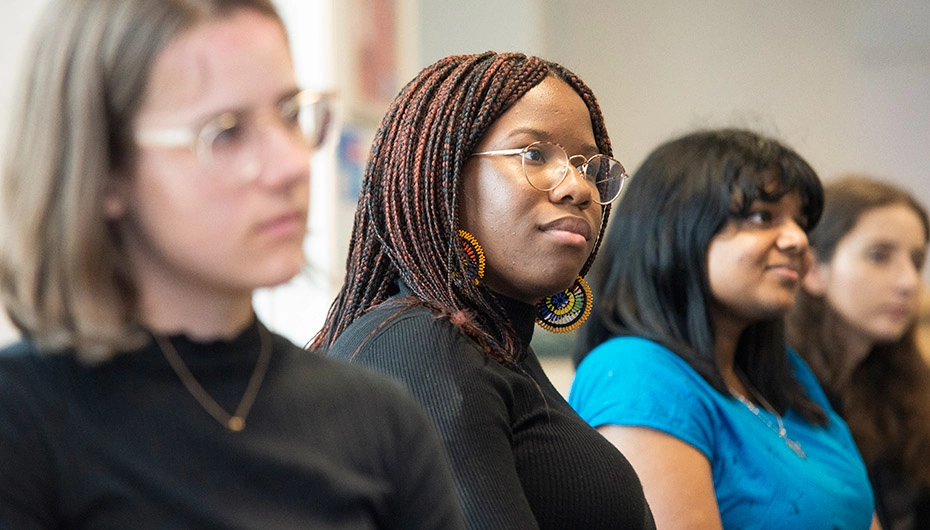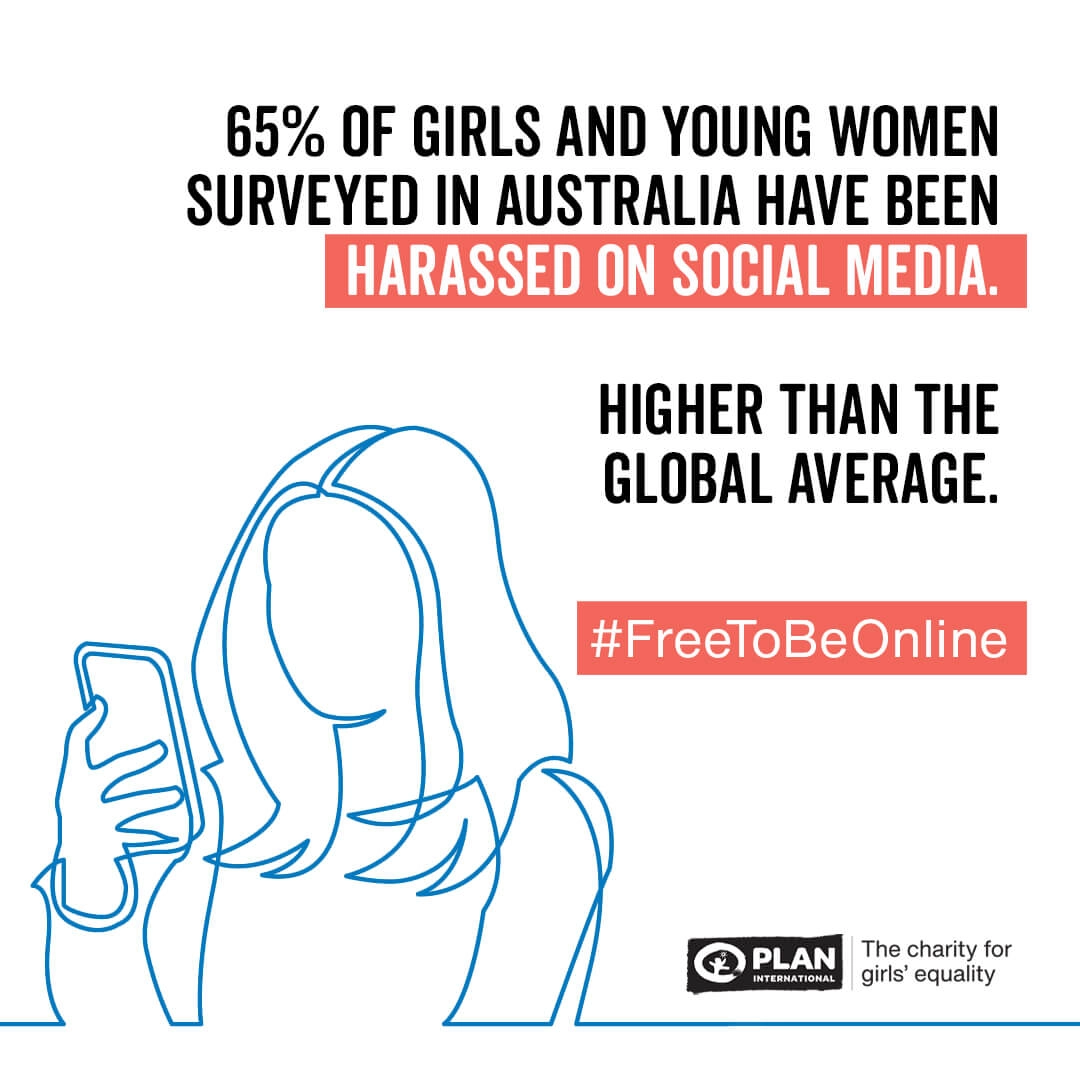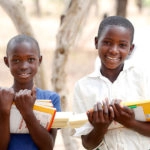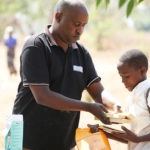Media Centre - Media release - 5 October 2020
Social media is the new frontier for gendered violence, as biggest ever global study of girls’ experiences online reveals endemic abuse and harassment

Girls and young women worldwide are demanding social media companies take urgent action to protect them, as a landmark survey has revealed universal and shocking accounts of escalating online violence.
In Australia, 65% of girls and young women aged 15-25 have been exposed to a spectrum of online violence (compared to the global figure of 58%), and half of those who have experienced harassment have suffered mental and emotional distress as a result.
One in five Australian girls and young women have feared for their physical safety due to online threats.
Plan International, the charity for girls’ equality, surveyed 14,000 girls aged 15-25 across 33 countries, including Australia, Canada, Brazil, Benin, Japan, Zambia the USA and India (full list in notes below).
The Free to Be Online report is the largest ever study of its kind to map the experiences of girls on social media. In all 22 countries, girls had been exposed to explicit messages, pornographic photos, cyberstalking and other distressing forms of abuse.
The most common type is abusive and insulting language, reported by more than half (59%) of girls, followed by deliberate embarrassment (41%), body shaming and threats of sexual violence (both 39%).
Globally, attacks are most common on Facebook, where 39% have suffered harassment, followed by Instagram (23%), WhatsApp (14%), Snapchat (10%), Twitter (9%) and TikTok (6%).
Disturbingly, one in five (19%) who had been subject to online violence significantly reduced their use of social media, while one in 10 (12%) changed the way they expressed themselves online. Almost half (44%) of all the girls and young women surveyed said social media companies needed to do more to protect them.
This abuse damages girls’ lives offline, with one in five (22%) of those surveyed across 22 countries saying they or a friend have been left fearing for their physical safety. One in three (39%) reported low self-esteem, and a similar number (38%) said the harassment caused mental and emotional stress. One in five (18%) said it caused problems at school.
social media also has an ugly side, where the worst of humanity has manifested, violence has flourished to the point where for many girls, abuse is a day to day realityIn Australia, 1000 girls and young women aged 15-25 were surveyed as part of the global research. On most measures, they fared worse than the global average. The Australian data showed:
- Australian girls are huge consumers of social media. Almost all surveyed (99%) use social media and three-quarters surveyed (75%) are frequent users.
- Two-thirds (65%) of Australian girls and young women reported that they have experienced some form of online harassment on a social media platform. Most girls started to experience harassment on social media between the ages of 12-16.
- 44% of Australian girls report having experienced harassment on Facebook, followed by 35% of girls experiencing harassment on Instagram and 24% of girls experiencing harassment on Snapchat.
- When asked who was perpetrating the violence: 40% said they experienced harassment from people at school or work, 29% said a friend and 16% former partners. More than one-third of girls (38%) said they had been harassed by anonymous social media users.
- For girls who identified as LGBTIQ+ online, close to half said they experienced harassment due to their sexual or gender identity, and 60% of girls who identified as an ethnic minority said they had been specifically targeted because of this.
- Of the Australian girls we spoke to, three-quarters (71%) said that they or other girls had experienced negative effects, including lower self- esteem, mental or emotional stress or trouble at school, due to being harassed on social media platforms.
- One in five (21%) have experienced feeling physically unsafe as a result of online harassment, while half (53%) had lower self-esteem or loss of confidence and (51%) had experienced mental or emotional stress.
- When we asked girls and young women who was responsible for enacting positive change to stop online harassment, close to half of all Australian girls (45%) identified social media platforms as best placed to address it (when asked to choose from a list including governments, police, civil society, and other internet users.

CEO of Plan International, Susanne Legena, said as more girls worldwide are living their lives online than at any point in history, the impact of spiralling levels of abuse were deeply troubling.
“Social media has profoundly shaped our society in ways none of us expected and COVID-19 has driven billions around the world to shift their existences online. It has given voice to millions of young people to fight for their rights and a better future. But social media also has an ugly side, where the worst of humanity has manifested, violence has flourished to the point where for many girls, abuse is a day to day reality,” Ms Legena said.
“When you consider the shockingly high number of girls worldwide who are subject to abuse every time they participate in discussions online, in addition to being hassled and harassed on the street when they step outside their homes, and that harassment is a form of violence, there is no space – virtual or other – where girls are safe and free from violence.
“As a result, girls are reporting long term mental health problems and in many cases, are opting out of expressing themselves and their opinions for fear of retribution, and sometimes removing themselves from these platforms altogether. Once again, as we’ve seen with street harassment, perpetrators are using their perceived power to silence girls and to force them out of spaces that should be safe and welcoming for them. And this is absolutely unacceptable.
There’s no doubt about it: social media is the new frontier for gendered violence and the rapid escalation we’ve witnessed during the coronavirus pandemic is chilling“The bitter truth we must accept is this: online violence is serious. It silences girls’ voices and it causes real and lasting harm. So we must ask, what are we going to do about it?”
“Everyone is accountable for keeping girls safe, from individuals to bystanders, to governments. We’re starting our campaign to clean up the internet with the social media companies, because that is who girls have told us they want to respond to this, first and foremost.”
Plan International Australia’s girl-led campaign calling on social media companies to improve reporting launches today. It feeds into the global campaign and aims to create a critical mass of voices calling for social media companies to make vast improvements to their platforms to protect girls, listen to them, to take their complaints seriously and to clean up the feeds.
“There are mechanisms on every platform to report abuse and harassment and indeed many of these social media giants have made vast improvements recently, but the reality is that abuse is endemic. It is thriving under COVID-19 lockdowns, it’s global and almost universal in its nature, yet the consequences for those who perpetrate it are arbitrary and oftentimes non-existent.
“Girls tell us that when they report, often clearly quite horrific offensive content is inexplicably deemed as acceptable and even when their attackers are banned, they’re back at it days later and often under the protection of anonymity. The system is broken and something needs to change.”
The open letter to social media companies can be accessed here: https://plan.org.au/free-to-be-online/
About the Research
- Research for Free to be online? Girls’ and young women’s experiences of online harassment was carried out in 32 countries. This includes a survey of 14,071 girls and young women in 22 countries, conducted on behalf of Plan International by Kantar and Ipsos between April 1 and May 5, 2020, and an additional series of in-depth interviews.
- Kantar and Ipsos surveyed girls in Australia, Benin, Brazil, Canada, Colombia, Dominican Republic, Ecuador, Germany, Ghana, Guinea, India, Indonesia, Japan, Kenya, Netherlands, Nigeria, Norway, Philippines, Spain, Thailand, USA and Zambia. Girls were asked about their experiences of using Facebook, Twitter, Instagram, Tik Tok, Snapchat, WhatsApp, WeChat, YouTube and Line.
- Girls and their allies around the world have written an open letter calling on social media companies to create ways to report abuse and harassment that really work. Sign the letter here.
- Whilst this research was conducted prior to COVID-19 lockdowns, according to the eSafety Commissioner, the pandemic has driven an alarming spike in reports about online harms. Their latest reporting stats, from quarter April – June 2020, show a 255 per cent increase in the distribution of intimate photos and videos without the person’s consent, a 96 percent increase in harmful online content, including child sexual abuse material, a 19 per cent increase in the cyberbullying of young people and a 35 per cent increase in adult cyber abuse reports compared with the same time last year.
Media contacts


